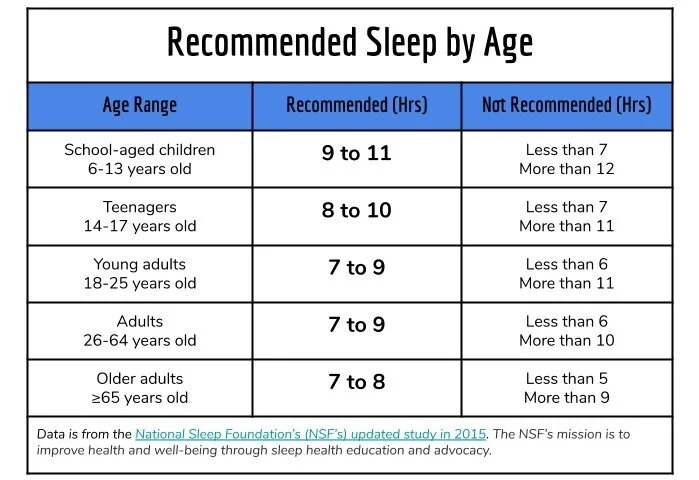SLEEP: Protect the Asset
As Greg McKeown, Author of The Disciplined Pursuit of Less, puts it "The best asset we have for making a contribution to the world is ourselves". Yet, we constantly make choices that compromise our day-to-day functioning, most commonly getting too little sleep. By protecting the asset (you!) and getting enough sleep, you're able to move through your day with more energy, creativity, higher cognitive functioning and are generally happier and less irritable. That sounds better, right?
So how much sleep is enough? The short answer is somewhere around 8-9 hours. That varies by age and other factors, of course. Take a peak at the table below to see how you (and your family) are doing.
There's an extra column in the table below that's important to take a look at - the data under the heading "Not Recommended (Hrs)". This is where we start to see significant declines in our physical, mental and emotional well-being. For 6-17 year olds, less than 7 hours a night is problematic. When we get less sleep than we need each night, we begin to create a sleep deficit. Just as any other deficit, it takes time (meaning more than one night of good healthy sleep) to get out of it.
How to Preserve Your Sleep
Here are a few tips on how to create better sleep habits and "protect the asset":
Stick to a sleep schedule, even on weekends. This helps to regulate your body's clock, helping you fall asleep and stay asleep for the night.
Practice a relaxing bedtime ritual. Create a relaxing, routine activity right before bedtime. It will help signal to your body that it's time to wind down for the night.
Create a digital curfew for your tech. We'd recommend 1-2 hours before you go to sleep and after you wake up.
Exercise daily. Vigorous exercise is best, but even light exercise is better than no activity. Exercise at any time of day, but not at the expense of your sleep.
Evaluate your bedroom. Ensure an ideal temperature, and eliminate noise and light. This means no phones in the bedroom! Buy a regular alarm clock if that's an obstacle for you.
Don't eat too much too late. If our body is still digesting food as we try to fall asleep, or while we are sleeping, it can cause lighter or disrupted sleep.
Weekly Challenge!
It's time to improve your sleep. Whether its the amount or quality of sleep you’re getting, there's always room for improvement. This week, choose at least one of the recommendations above to incorporate into your life and start getting better sleep tonight!


